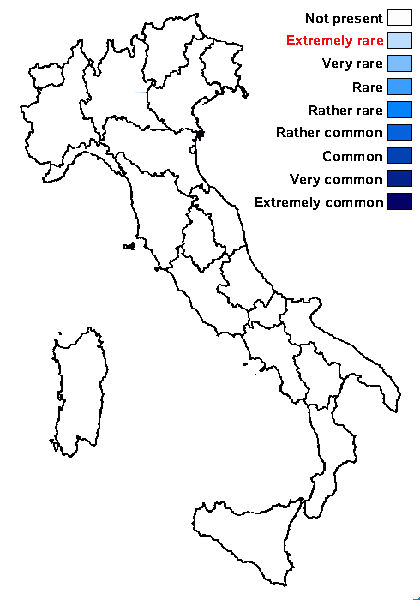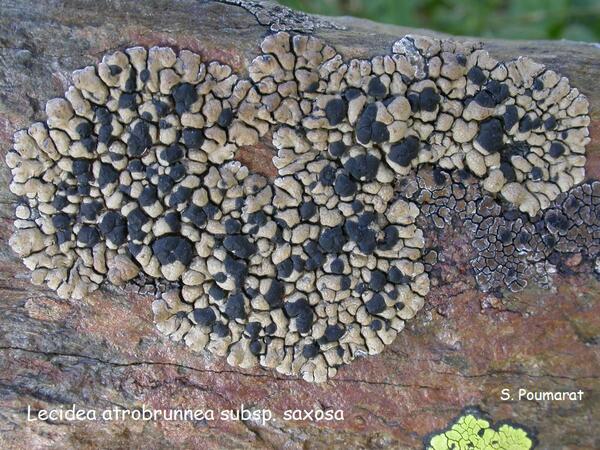Lecidea atrobrunnea (DC.) Schaer. subsp. saxosa Hertel & Leuckert
Lichen Flora of the Greater Sonoran Desert Region, 2: 296, 2004
Synonyms:
Distribution:
Description: Thallus crustose, episubstratic, 0.5-2.5 mm thick, areolate to almost squamulose, of flat to strongly convex, up to 3 mm wide, yellow-brown, copper-brown or dark reddish brown, often shiny areoles with or without a thin, whitish to blackish edge; prothallus absent or usually conspicuous, dark. Medulla white, I+ intensely blue-violet, Apothecia lecideine, black, 0.5-1.5(-2.5) mm across, often clustered, slightly constricted base, with a flat to convex, rarely bluish-pruinose disc, and a persistent, raised, often slightly wavy proper margin. Proper exciple of parallel-radiating, 3-7 µm thick hyphae, blue- to green-black in outer part, colourless or very pale brown within, 25-150 µm wide laterally; epithecium bright green, bluish-green, or olive-green; hymenium colourless to very pale greenish in upper part, 40-65 µm high, I+ blue; paraphyses coherent, usually simple or shortly branched in upper part, rarely anastomosing, 1.5-2.5 µm thick at mid-level, the apical cells clavate, 3-5 µm wide; hypothecium colourless to pale brown, I+ blue. Asci 8-spored, narrowly clavate, thick-walled, with a K/I+ pale blue tholus and a strongly amyloid, thin apical cushion, surrounded by a I+ blue outer layer, Lecidea-type. Ascospores 1-celled, hyaline, ellipsoid-oblong, with rounded ends, (5-)7.5-11.6(-13) x 3-7 µm. Pycnidia immersed with a usually irregular to graphidioid ostiolar region. Conidia bacilliform, (5.5-)9.4-16.7(-26) x 0.8-1.4 µm. Photobiont chlorococcoid. Spot tests: thallus and medulla K+ yellow turning red, C-, KC-, P-. Chemistry: two chemotypes: a) with norstictic and planaic acid, b) with norstictic and confluentic acid, and/or 2’-O-methylplanaic acid.Note: a rather common chemical strain of the L. atrobrunnea-complex containing the substances of the norstictic acid syndrome; widespread in the mountains of the Northern Hemisphere, including the Alps, but with all records outside the Italian territory: to be looked for in the Italian Alps.
Growth form: Crustose
Substrata: rocks
Photobiont: green algae other than Trentepohlia
Reproductive strategy: mainly sexual

Predictive model
Growth form: Crustose
Substrata: rocks
Photobiont: green algae other than Trentepohlia
Reproductive strategy: mainly sexual

Predictive model
 Index Fungorum
Index Fungorum
 GBIF
GBIF


